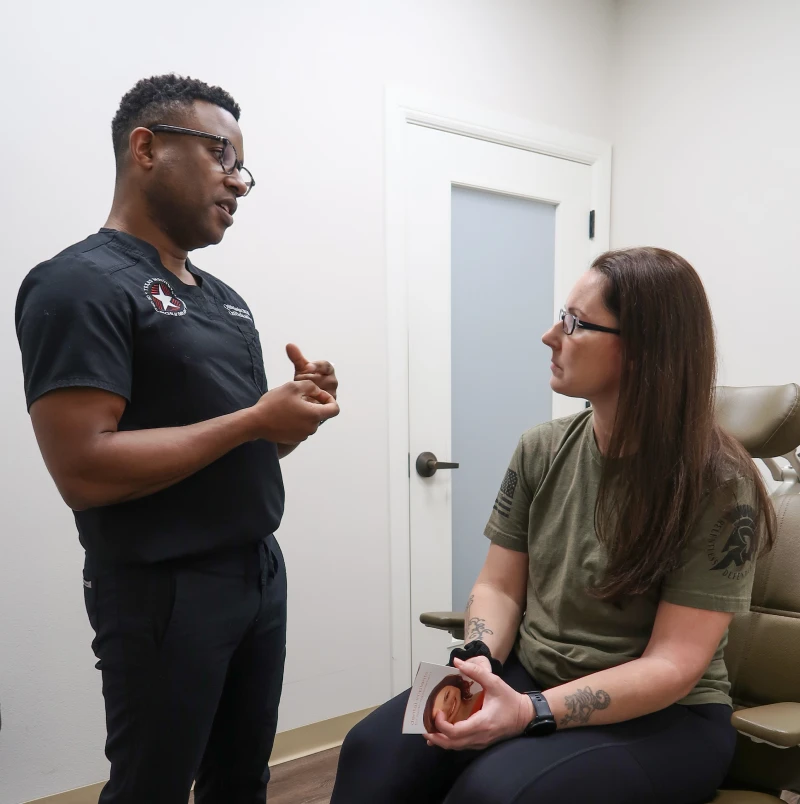Stop the Ache and Protect Your Bite
Wisdom teeth can be deceptively problematic. One day, they may feel fine, and the next, they can cause significant discomfort in your daily life. When there isn’t enough room for these teeth to emerge, they may lead to:
- Jaw pain that lingers or worsens
- Shifting teeth or crowding
- Difficulty biting, chewing, or speaking comfortably
- Increased risk of infection or persistent bad breath
You don’t have to live with discomfort. At the Texas Institute of Oral, Facial & Implant Surgery in Midlothian and Duncanville, Dr. Slaughter’s expert care gently removes impacted teeth, so you can feel like yourself again.
Wisdom Teeth Pain Shouldn’t Stop You
Wisdom teeth, also called third molars, usually appear between the ages of 17 and 25. The problem? Most mouths simply don’t have enough space. When these teeth try to erupt, they can become trapped (impacted), causing swelling, infection, or damage to neighboring teeth.
While our ancestors needed extra molars for tougher diets, wisdom teeth serve little purpose today and often cause more harm than good. The good news? Removing them is a straightforward way to prevent pain and protect your overall oral health.
What to Expect During Surgery
Step 1: Sedation and Comfort
We’ll begin by administering the right type of anesthesia for your needs, so you feel calm, relaxed, and comfortable.
Step 2: Gentle Removal
Once the area is numb, a small incision is made in the gum to access the wisdom tooth. In some cases, the tooth is removed in smaller sections to protect the surrounding bone and tissue.
Step 3: Cleaning and Healing
After removal, the site is carefully cleaned to reduce the chance of infection. The incision is closed, and we’ll guide you through simple recovery steps so you can heal comfortably at home.
Tips for a Faster Recovery
 What to Do After Surgery:
What to Do After Surgery:
- Follow Dr. Slaughter’s post-surgical instructions closely.
- Apply ice packs during the first 24 hours to reduce swelling.
- Stick to soft foods and fluids for the first two days.
- Rest, then resume everyday activities at your own pace.
- Brush gently, avoiding the surgical area.
What to Avoid After Surgery:
- Skip straws for at least 24 hours to protect healing blood clots.
- Avoid vigorous rinsing until clotting is secure.
- Refrain from smoking, which can slow healing.
What Patients Ask Most
Why do my wisdom teeth hurt?
Wisdom teeth are the last to develop, and often there isn’t enough room for them to come in. When they become impacted, they press against other teeth and cause significant discomfort.
What happens if I ignore an impaction?
Impacted wisdom teeth usually get worse over time. They can damage nearby teeth, affect your bite, or harm your jawbone. Removing them early prevents these problems from escalating.
Is wisdom tooth removal difficult?
Because impacted wisdom teeth may not break through the gums, they can’t always be pulled easily. In these cases, Dr. Slaughter carefully exposes and removes the tooth in sections to protect the surrounding tissue.
How long does recovery take?
Most patients feel ready to return to their usual routine within 2–3 days, while full healing takes a couple of weeks. Dr. Slaughter will give you clear, personalized after-care instructions to help your recovery go smoothly.
Ready to Relieve Your Pain?
The longer you wait to extract an impacted wisdom tooth, the more discomfort and subsequent oral health issues it can cause. Don’t wait until symptoms worsen. Schedule a consultation with Dr. Slaughter at the Texas Institute of Oral, Facial & Implant Surgery in Midlothian and Duncanville today.



